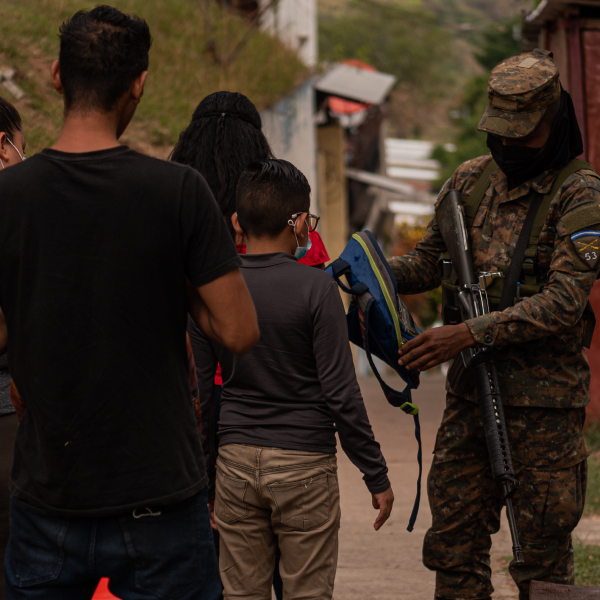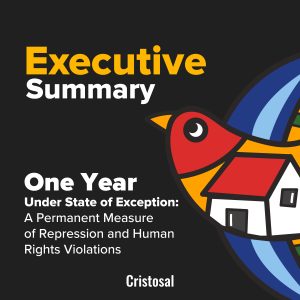
Executive Summary: One Year Under State of Exception
Cristosal’s investigation into the human rights impacts of the first year of suspended Constitutional guarantees in El Salvador presents the first substantiated account of the deaths in state custody and documents the systematic practice of torture inside the prisons.
The report includes information on the situation of women, children, adolescents and the LGTBIQ+ population, as well an analysis of the judicial reforms that limit or obstruct fundamental legal guarantees of the tens of thousands of people arrested since the end of March 2022.
Cristosal documented 139 deaths of people held in custody under the state of exception from its start on March 27, 2022 and through the first year. In that time, four women and 135 men. None of the people who died had been found guilty of the crime for which they were charged at the time of arrest. By April 2023, Cristosal had recorded 153 deaths.
The findings presented in the report came from field research including investigations of mass graves and the collection of extensive photographic documentation of the bodies and medical examiner’s autopsy reports from Institute of Legal Medicine (IML). Information was also obtained through interviews with family members, neighbors, acquaintances of the deceased and from other individuals who had been detained. The vast majority of people interviewed expressed fear of retaliation from authorities if their identities were revealed or if they gave public statements. Their most pressing concern was how to care for the children of the deceased. Moreover, many of these families have also been forcibly displaced.
The investigation revealed that the deaths which occurred in state custody were the result of torture and serious and systematic injuries inflicted on the detainees. Photos showed and the IML had documented signs of asphyxiation, fractures, numerous contusions, lacerations and even puncture wounds on the bodies. Nearly half of those who died in prisons were victims of what were classified as confirmed, possible or suspected violent deaths. Nearly one-fifth of these deaths were caused by conditions indicating deliberate negligence in the provision of health care, medicine and food, including deaths caused by malnutrition.
The report details dozens of testimonies and cases. One of these cases involved a 24-year-old man who was a fisherman and died in the ambulance shortly before his arrival at the Zacamil National Hospital on the outskirts of San Salvador. His body had a puncture through one of his shoulders and lacerations on his knees, according to the IML report he died as a result of “pulmonary edema”. According to the family, the impact of the death caused his wife, who was five months pregnant, to lose their future child.
The report delves into the practice of torture and cruel, inhuman and degrading treatment widely inflicted on thousands of detainees under the regimen. Such actions make it clear they are part of a policy of repression carried out by prison guards and prison administration officials. These actions obviously require the authorization and backing of the highest level security authorities.
The testimonial evidence confirms the practice torture when people are first admitted to the prisions. Examples of this include guards using batons or clubs to inflict trauma, forcing prisoners to hold certain positions such as kneeling on gravel until they bleed, being forced to squat for long periods of time, and using other means to restrain their movement. These forms of torture were reported to continue throughout their time in custody.
Among the cases investigated, some presented signs of strangulation, use of electric shock, and puncture wounds were observed on bodies of people who died while in custody. The indiscriminate use of pepper spray to inflict pain was also documented. Some of the extreme humiliations that were reported include dumping prisoners’ food on the ground and in the mud, then threatening them and forcing them to eat directly from the ground using only their mouths and calling them “dogs”. Prisoners reported having been forced to witness torture inflicted on others, including some who witnessed guards beating them to death.
One of the testimonies of torture came from a 23-year-old man. “When we arrived at the prison they took us off the bus and the first thing they did was to bend us over and force us to kneel on the gravel. We spent half an hour kneeling on the gravel and trembling with fear because we had seen what happened when another group arrived earlier; they were bent over, on their knees, and then they beat you. Next to me there was a guy who had osteoporosis, he was shaking with fear and told me ‘they are going to kill me here’, and I told him ‘calm down’. They didn’t beat me, but that guy couldn’t run because he was sick. He was going slowly and so they beat him, even though he was sick, they didn’t care about that. He told them he had to take a pill, because he was carrying some pills and he said he was going to have an attack. They didn’t care, they threw them away. They have no respect for you, for them you are useless, and you are practically trash.“
Arbitrary mass arrests mark the entry point into a cycle of terror that, in addition to what has been described above, includes the use of de facto preemptive sentencing and trials without due process. As Cristosal has pointed out in previous reports, these are systematic human rights violations, carried out as a State policy implemented at the highest level, systematically and directed at a specific segment of the population ( poor, mostly young, residents of communities in conflict), making it possible to classify them as crimes against humanity under international law.
This investigation is particularly relevant given a context marked by widespread failure to provide public information, the manipulation of statistics and the distortion of data to promote the image of the government’s handling of public security. Even the families of people who were imprisoned during the state of exception have been denied information about the living conditions of their loved ones, their health condition and, even more troubling, the date and cause of their death. The Central Office of Prisons (DGCP) does not notify the death of people in its custody whether from natural causes or violence. In most cases, the family finds out about the death through funeral home employees or, sometimes, through social media.
Cristosal calls on the Salvadoran State to shed light on the prison conditions, respect due process, release innocent people, answer for the deaths in its custody, provide all the necessary information to their families, and put an end to these practices, being protected by an unconstitutional state of exception.

